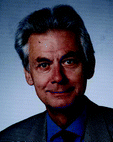DOI: 10.1039/C4CC90032D
(Profile)
Chem. Commun., 2014, 50, 2984-2985
Interview with Herbert W. Roesky
|
Herbert W. Roesky is Emeritus Professor at the Georg August University of Göttingen. He retired ten years ago. He was a post doc with the Du Pont Company in Wilmington, Delaware. He then served ten years as a full professor in Frankfurt/Main and 23 years in an equivalent position in Göttingen. He was elected president of the Göttingen Academy of Sciences for six years and vice president of the German Chemical Society for two years. He was awarded the RSC Centenary Lecture in 1985, and in 2006 he was elected an Honorary Fellow of the RSC. He is a main group chemist and his research is focused on fluorine, silicon, and aluminum chemistry. |
Do you remember what it felt like to publish your first ChemComm article?
My first ChemComm paper dates back to the year 1969, and of course you can imagine that I will never forget the exciting news that this manuscript has been accepted in a foreign journal. In this article, phosphorus fluorine compounds were described, and this positive result from the RSC contributed tremendously to the basis of my research in fluorine chemistry.How has your research evolved from your first to your most recent article?
Fluorine chemistry is still my old love which I never will give up, although I have changed the topic of my research every ten years to stay awake with a new challenge. My most recent article in ChemComm describes an exciting new germanium Ge3 compound with a hitherto unknown bonding situation. In general these days we make fluorine bonds to low valent elements. This seems to be a contradiction as fluorine is known as a very strong oxidizer.What do you like most about publishing in ChemComm?
As a retired professor, one has very limited resources of money and one has to decide to either buy chemicals for the post docs or to spend the money on colour figures. I am very pleased with my publications in ChemComm due to the free use of colour. Moreover, the turnaround time for a manuscript at the RSC is extremely short. The table of contents in ChemComm is very professional and makes browsing the articles quite easy.What aspects of your research are you most excited about at the moment?
Our research work on radicals in the coordination sphere of a metal is a very exciting field. The activation energy can be tremendously reduced, and for example hydrogen gas reacts already quantitatively at room temperature in the presence of a manganese complex. Another exciting topic is the stabilisation of atoms in the coordination sphere of carbenes. This is demonstrated in my recent ChemComm paper.What is the best part of your job?
My life is chemistry. I am excited about every new result my post docs discover, especially those results which I have not predicted. Normally these are much more exciting and show us the way to proceed further in an adventurous field.What is the secret to success in scientific publishing?
I like scientific curiosities. These you will meet when you are not following the steps of routine chemistry. Trying something original which others have not seen leads you to success.What is your advice to young emerging scientists?
Never give up! When a paper is rejected by ChemComm take this as a positive sign. Improve the manuscript and send it again to the editor. Publishing is like sport; you cannot win every match but you will become better!What do you do in your spare time?
I enjoy writing books on chemical experiments, and I like to show these experiments in public. It is chemistry without fire and bangs. I rather want to show the beauty of chemical reactions. I like to go hiking in the mountains in various countries, but nowadays it is reduced to walking.By the time I'am 100 I would like to have…
Einstein mentioned that it is impossible to predict the future. Anyhow, I would like to have a brain that tells me when I should give up chemistry before I reach this goal.| This journal is © The Royal Society of Chemistry 2014 |

